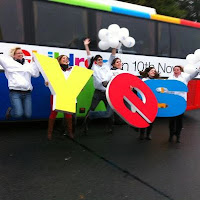This is what happened Steven Moffat in The Snowmen, this year’s Christmas episode of Doctor Who. He had a new title sequence, a new Tardis, a new companion, as fine a scenery-chewer as is known to humanity to play the villain – but what he didn’t have was a story to pull it all together. Doctor Who is a kids’ show – it needs a narrative. Leave the other stuff to Pirandello.
It can’t be easy to write Doctor Who. The show’s fiftieth anniversary looms in eleven months from now and there is a huge population who want to see something spectacular to mark the occasion. They may be the sort of human plankton who have no lives and are in front of their laptops when they should be partaking of festive cheer, but they are people too and are capable of weeping. More to be pitied than censured, really.
Perhaps the pressure of that anniversary is getting to Steven Moffat, the man in charge of Doctor Who (now gloriously titled the “Whopremo”). He will surely want to do better than the twentieth anniversary show, which really wasn’t that good. He is also distracted by Sherlock, which is as good a show as exists on TV currently.
But for whatever reason, Moffat dropped the ball tonight with the Christmas episode. Did anybody really understand it? You correspondent didn’t and, like the Reverend Mother in Midnight’s Children, An Spailpín is not stupid, having read several books.
It’s also worth questioning the point of hiring as fine a scenery-chewer as is known to humanity and not writing lines for him to gorge on. Michael Gambon was eye-rollingly superb in Moffat’s first Christmas episode, a Christmas Carol, but Richard E Grant was wasted in The Snowmen. He got one peach of a line near the start but spent the rest of the show pretty much sucking a lemon and having to pretend he liked it.
As for Clara, the new companion, she was there and then she wasn’t. Jenna Louise-Coleman has now played the new companion as a computer-savant, a barmaid and a governess. The Doctor himself generally waits for a regeneration to make a personality change but Clara/Oswin seems to go through them in the time it takes to hard-boil an egg.
It would be nice if the powers that be were to let her aye be aye and her nay be nay. Miss Coleman is as cute as a button but she may have to keep notes written on the back of one of her dainty little hands to remember if she’s the same person after lunch as she was at elevenses.
Perhaps Moffat is just trying too hard? The presence of those anonymous bloggers in bedrooms terrorize both young and old, but sometimes maybe you’re better to just have the Doctor let one companion go, grab the next by the hand and run down a corridor somewhere. This is Doctor Who, after all. There’s a formula that’s worked for fifty years. There’s no need to re-write it as six characters in search of an alien.















